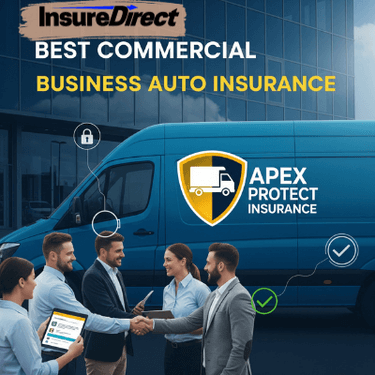When I run a business that uses vehicles, it’s a whole different ball game. You gotta think about accidents, liability, damages — the whole lot. Whether it’s one van or a bunch of trucks, commercial auto insurance is something I never skip. It’s the safety net for my company’s vehicles and people.
But man, commercial auto insurance policies can get pretty confusing and sometimes expensive if you don’t know what you’re doing. So, I thought I’d share some of the tips I learned along the way to get solid coverage without burning through cash.
What Exactly Is Commercial Business Auto Insurance?
Alright, so commercial auto insurance isn’t like your personal car insurance. This one’s meant for vehicles mainly used for business purposes. Think of trucks, delivery vans, or company cars that transport stuff or employees.
Usually, these policies cover things like:
Liability if your vehicle causes injuries or property damage
Fixing or replacing your vehicles if something bad happens
Medical costs for people hurt in your vehicles
Coverage even for cars you rent or hire for work
Because business vehicles often run more miles and carry heavier loads, the insurance is priced differently than your everyday car insurance.
Tip #1: Don’t Forget to Tell Insurers About Every Vehicle and Driver
From what I learned, it’s super important to give the insurer a full list of all your vehicles and the people who drive them. Missing out on even one vehicle or driver could cause your claims to get denied later.
I always make sure:
To include owned, leased, and rented vehicles used for work
List all employees who drive company cars
Update the policy quickly if we add or remove vehicles or drivers
Being upfront like this saves a lot of headache down the road.
Tip #2: Pick Coverage Limits That Make Sense
You don’t want to skimp on coverage limits, but you also don’t wanna pay more than necessary. I usually think about the value of my vehicles and the risks involved before choosing limits.
Here’s what I consider:
How much my vehicles are worth and what could happen if there’s a big accident
Contracts with clients sometimes need minimum insurance amounts
State laws might require certain coverage levels
I try to find the sweet spot—enough to protect the business, but not break the bank.
Tip #3: Bundle Insurance Policies When Possible
If your business needs other insurance types, like property or liability, bundling can be a smart move. I noticed that when I combined policies with one insurer, I got a discount.
Bundling has its perks:
Usually cheaper premiums overall
Easier to manage when you deal with one company
Better coordination between different types of insurance
Definitely worth asking your agent about.
Tip #4: Safety First—Train Your Drivers
From my experience, insurers really like it when you show you care about driver safety. I’ve put together some training programs and keep tabs on driver behavior using GPS trackers.
Doing this has helped:
Reduce accidents
Lower my insurance costs
Create a culture where safety is a priority
If you want my advice: never overlook driver safety programs.
Tip #5: Know What Your Policy Covers—and What It Doesn’t
Policies can vary a lot, so I always read the fine print to understand the limits. Some things I found aren’t covered include:
Personal use of company vehicles if not authorized
Damage caused on purpose or illegal activities
Normal wear and tear or mechanical issues
Certain cargo or hazardous materials
If you need special coverage, like for refrigerated trucks or cargo, ask your insurer about extra options.
Tip #6: Don’t Just Go With The First Quote
Seriously, shopping around is key. I always get several quotes before choosing an insurer. Prices can differ a lot, and sometimes the cheapest isn’t the best.
What I do:
Compare different providers
Look beyond price—check what’s covered and deductibles
Read reviews about their claims service
This helps me pick a good balance of cost and quality.
Tip #7: Keep Your Paperwork Straight
When a claim happens, you want to be ready. I keep all important documents organized:
Vehicle registrations and service records
Driver licenses and training certificates
Accident reports and claim paperwork
Inspection and compliance proofs
It makes the whole claim process smoother and less stressful.
Tip #8: Review Your Insurance Every Year
Business changes over time, right? So do my insurance needs. I make it a point to review my policies yearly to keep everything up to date.
I check for:
Updated vehicle and driver info
Whether my coverage limits still fit my business
New insurance providers or better deals
Changes in risks or operations
Regular reviews keep me confident I’m well protected.
Final Words: Don’t Take Commercial Auto Insurance Lightly
At the end of the day, commercial auto insurance isn’t just a box to check — it’s protecting what keeps my business moving. Following these tips has helped me keep coverage solid without paying more than I need.
If you’re new or feel overwhelmed, I’d say: talk to an insurance pro. The right advice can make a huge difference.
If you’re looking for top-notch insurance coverage, InsureDirect has you covered. Getting a home insurance quote is simple and fast. Just visit our website or reach out to our corporate office at:
InsureDirect.com
Corporate Home Office
618 South Broad Street
Lansdale, Pennsylvania 19446
contact@insuredirect.com
Phone: (800) 807-0762 ext. 602
Protect your home and enjoy peace of mind with the reliable insurance solutions from InsureDirect. Because your home deserves the very best.

